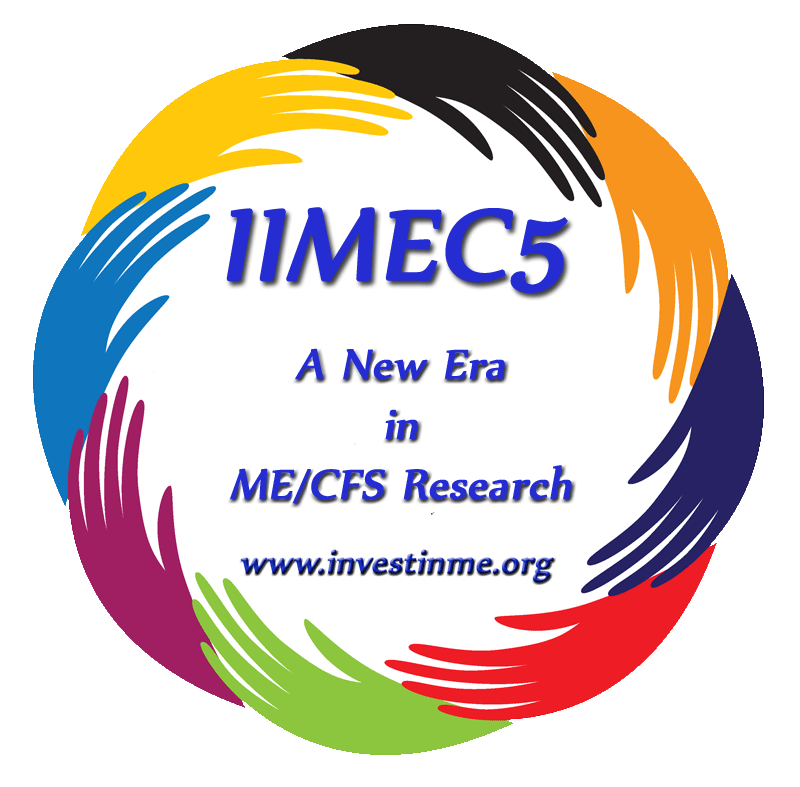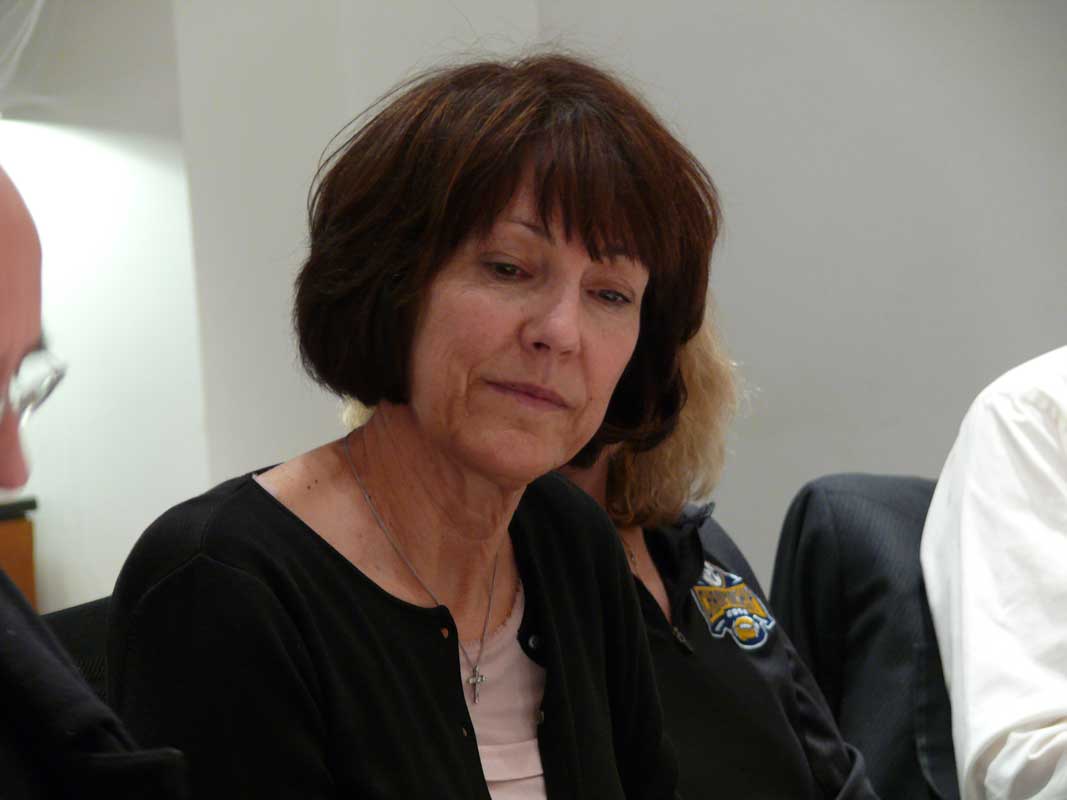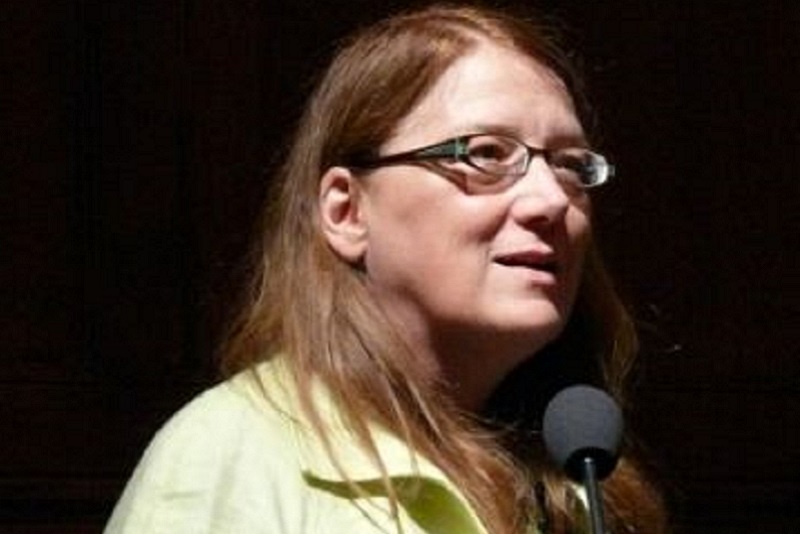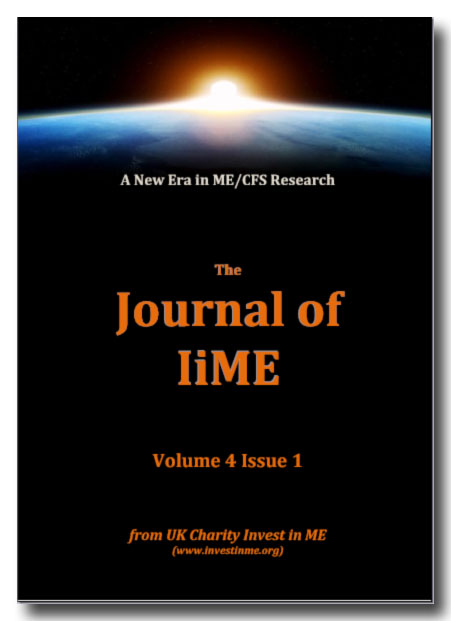
Invest in ME Research International ME Conference 2010
IIMEC5 - A New Era in ME/CFS Research

Click on sections below
With fourteen countries represented at the conference the 5th Invest in ME International ME/CFS Conference brought together researchers, clinicians, journalists, patients, support groups and even film crews. IiME also self-funded places for some media persons and some researchers and offered places to others in order to improve knowledge of ME.
Unfortunately the editor of the British Medical Journal, despite numerous emails inviting her to come and assurances that the BMJ would be represented at the conference, nevertheless left it to nine hours before the conference start to inform that she would not be attending. The fact that the BMJ could not find one person to attend this major conference made it difficult for anyone to have any faith in the BMJ editorial staff ever commenting on the subject of ME and be taken seriously.
With hindsight the BMJ's tunnel vision was predictable. But there are many more positives from the conference to make up for establishment apathy. One of the attendees at the conference, Dr Martin Scurr, a GP and also writer of a column in the Daily Mail entitled "Ask the Doctor", wrote after the conference in his column of 7th June the following -
"I admit it, I was wrong. For many years, I - like many of my medical colleagues - have blamed ME on psychological or behavioural causes.
Then, last month, I attended the 5th (Invest in ME) World Conference on ME/CFS (myalgic encephalomyelitis/chronic fatigue syndrome)."
For a doctor and a national newspaper to admit they have been wrong demonstrates the conferences are having an effect.
As we have maintained all the while education about the illness is the surest way to defeat the vested interests who have much to lose or who make a living out of the misinformation about ME. The online article by Dr Scurr is available - click here. The American Journal of Biochemistry and Biotechnology invited all of the Invest in ME 2010 conference speakers to submit their papers for publication. The first one by Professor Leonard Jason is now available online. We are pleased to see this paper on a revised Canadian Definition published for the wider audience - click here. [also http://www.investinme.org/IiME%20AJBB%20Conference.htm].
The 2010 conference DVD has already been distributed to twenty countries around the world.
A new feature for this year's conference DVD was a pre-conference "brainstorming" session with some of the speakers at the conference.
Conference Presentations from IIMEC5
Professor Malcolm Hooper
Professor Malcolm Hooper
Professor Malcolm Hooper is Emeritus Professor of Medicinal Chemistry, University of Sunderland and chaired many of the initial Invest in ME Research International ME Conferences.
Professor Hooper is an internationally-renowned expert on ME/CFS and a tireless campaigner for patients' rights.
Professor Hooper has previously chaired Invest in ME conferences and participates in The Hooper Interviews - interviews with conference speakers at the Invest in ME Conference.
Professor Hooper graduated from University of London and had held appointments at Sunderland Technical College, Sunderland Polytechnic and the University of Sunderland,
where he was made Emeritus Professor of Medicinal Chemistry in 1993.
He has served at many UK universities as well as in India and Tanzania.
He has inaugurated links with Indian research institutions and universities and celebrated 25 years of productive
and on-going links which have,
particularly, involved the design and development of new drugs for tropical diseases and an exploration of natural
products associated with Ayurvedic medicine.
He has published some 50 papers in peer-reviewed journals in the field of medicinal chemistry together with major
reviews on the Chemotherapy of Leprosy,
the Chemistry of Isatogens. Edited one book on the Chemotherapy of Tropical Diseases.
He acted as a referee for a number of important journals and
served on one editorial board. He has served on committees of the Council for National Academic Awards (CNAA), the
World Health Organisation
(WHO) and the Science and Engineering Research Council (SERC).
Professor Hooper is a member of a number of learned bodies, including
the Royal Chemical Society, the British Pharmacological Society and the Society for Drug Research (SDR),
now renamed the Society for
Medicines Research, where he has served on the committee for 12 years and served as Chairman for 2 years.
This involved the planning
and organising of major national and international conferences. He was appointed Chief Scientific Advisor to the
Gulf Veterans Association (GVA)
and accepted by the Ministry of Defence (MoD) as their nominee on the Independent Panel established to consider
the possible interactions between
Vaccines and NAPS tablets.
He has also served on the Gulf Support Group convened at the Royal British Legion. His involvement with the GVA brought
contact with Chronic Fatigue Syndrome/Myalegic Encephalomyelitis (CFS/M.E.) and related disorders. Gulf War Illness/Syndrome
(GWI/S) has much in common
with M.E./CFS.
He is Patron of the Sunderland and South Shields M.E. Association and a member of the Newcastle Research Group,
which includes eminent
physicians and scientists performing research in to CFS/M.E., where one recent aspect has been the identification of
organochlorine pesticide poisoning
being misdiagnosed as M.E./CFS. He has addressed meetings of the Pesticide Exchange Network and consulted to the
Organo-Phosphate Information Network (OPIN).
He worked with the Autism Research Unit (ARU) at the University of Sunderland for over 20 years, leading to involvement
in biochemical studies to offer help, support and treatment for people with autism. This has also lead to research and
urine-analysis of Indolyl-Acroyl-Glycine (IAG), which is an unusual metabolite found in excess of 90% of people
examined in different groups of GWV, M.E./CFS and Organo-Phosphate (OP) poisoning sufferers. He served on the
General Synod of the Church of England from 1970 to 1980 and he is a Christian Lay Leader, Preacher and Teacher.
He is currently involved in three environmental campaigns: Toxic waste dumping, including campaign against sewage in
the sea presenting to the Select Committee on
Sewage Treatment and Disposal GWI/S, presenting to the Defence Select Committee M.E./CFS and OP/Pesticide poisoning
Other Links
Professor Leonard Jason
Dr Leonard Jason, DePaul University, Chicago
Dr Leonard Jason has been among the most prolific of all ME/CFS researchers. For more than a decade, Dr Jason and his team at DePaul University’s Centre for Community Research in Chicago have worked to define the scope and impact of ME/CFS worldwide. Dr Jason is Vice President of the International Association for Chronic Fatigue Syndrome (now the IACFS/ME) and has been a key driver of CFS research since 1991, and is uniquely positioned to support collaboration between CFS researchers, patients, and government decision makers. His studies have shown that the direct and indirect costs of ME/CFS amount to $20 billion in the U.S. each year, and more than 1 million people suffer from ME/CFS as opposed to the estimated 20,000 people originally reported by the CDC (Centers for Disease Control and Prevention).
Professor Nora Chapman
Professor Nora Chapman, University of Nebraska, USA
Professor of Pathology and Associate Professor, University of Nebraska
Dr. Champan's primary research focus is on group B coxsackieviruses and their receptor(s). Professor Nora Chapman is a Research Scientist at the University of Nebraska Enterovirus Research Laboratory and Associate Professor at the University of Nebraska Medical Centre.
Professor Chapman studies persistent coxsackie infections in murine models of chronic myocarditis and dilated cardiomyopathy.
She and her associates have demonstrated that selection of defective enterovirus in heart and other tissues leads to persistent infections despite active antiviral immune responses.
Professor Chapman is presently studying the mode of selection of these viruses and the effects of replication of these viruses upon infected cell function.
Professor Chapman and her associates at the University of Nebraska are further investigating Dr. John Chia’s work in regards to enterovirus in the gut biopsies.
(From the Enterovirus Foundation site - click here)
Dr John Chia
Dr John Chia, Infectious Disease Specialist, Torrance, California, USA
Dr John Chia is an infectious disease specialist practicing in Torrance, California, USA and has published research recently (Chronic fatigue syndrome associated with chronic enterovirus infection of the stomach) on the role of enteroviruses in the aetiolgy of ME/CFS – an area which has been implicated as one of the causes by a number of studies. There are more than 70 different types of enteroviruses that can affect the central nervous system, heart and muscles, all of which is consistent with the symptoms of ME/CFS. By analyzing samples of stomach tissue from 165 patients with CFS, Dr Chia's team discovered that 82% of these individuals had high levels of enteroviruses in their digestive systems. Dr Chia's research may result in the development of antiviral drugs to treat the debilitating symptoms of ME/CFS.
Dr Paul Cheney MD, PhD
Medical Director of the Cheney Clinic in Asheville, North Carolina, USA
For more than 25 years, Dr. Cheney has been a pioneering clinical researcher in the field of ME/CFS and has been an internationally recognized authority on the subject of ME/CFS.
He has published numerous articles and lectured around the world on ME/CFS. Dr. Cheney has been interested in many aspects of ME/CFS, and is author or co-author of numerous publications and scientific presentations in a range of fields relevant to the illness.
While practicing in Lake Tahoe in 1984-1987, Dr. Cheney, along with Dr. Dan Peterson, helped lead a research effort with the NIH, the CDC and Harvard University School of Medicine studying a localized outbreak of what would eventually be known as ME/CFS.
He was a founding Director of the American Association of CFS (now the International Association for CFS/ME).
Dr. Cheney holds a PhD in Physics from Duke University in Durham, NC and is a graduate (MD) of Emory University School of Medicine in Atlanta, GA where he also completed his internal medicine residency. He is a board certified internist.
More recently, Dr. Cheney has been engaged in investigating the cardiac function of CFS patients, using Impedance Cardiography and Doppler Echocardiography. According to his paper presented at the 2007 IACFS/ME conference, "Chronic Fatigue Syndrome patients exhibit evidence of diastolic dysfunction at a level well above that reported for control populations of the same age. Energy dependent diastolic dysfunction would appear to be a hallmark of CFS and supports the hypothesis that CFS is a syndrome of cellular energy deficiency."
Since 1990, Dr. Cheney has headed the Cheney Clinic, presently located in Asheville, NC. The Cheney Clinic specializes in evaluating CFS patients and has expertise in diagnosis, disability support for and treatment of chronic fatigue syndrome. No single clinic has drawn as many CFS patients (currently over 5,000) from as many states (48) and foreign countries (22) as has the Cheney Clinic.
The Cheney Clinic has evaluated over 8,000 patients from 48 states and 24 foreign countries and participated in an FDA-approved multi-center , a biological response pharmaceutical drug trial using Ampligen, a biological response modifier.
For more than 25 years, Dr. Cheney has been a pioneering clinical researcher in the field of ME/CFS and has been an internationally recognized authority on the subject of ME/CFS.
He has published numerous articles and lectured around the world on ME/CFS. Dr. Cheney has been interested in many aspects of ME/CFS, and is author or co-author of numerous publications and scientific presentations in a range of fields relevant to the illness.
While practicing in Lake Tahoe in 1984-1987, Dr. Cheney, along with Dr. Dan Peterson, helped lead a research effort with the NIH, the CDC and Harvard University School of Medicine studying a localized outbreak of what would eventually be known as ME/CFS.
He was a founding Director of the American Association of CFS (now the International Association for CFS/ME).
Dr. Cheney holds a PhD in Physics from Duke University in Durham, NC and is a graduate (MD) of Emory University School of Medicine in Atlanta, GA where he also completed his internal medicine residency. He is a board certified internist.
More recently, Dr. Cheney has been engaged in investigating the cardiac function of CFS patients, using Impedance Cardiography and Doppler Echocardiography. According to his paper presented at the 2007 IACFS/ME conference, "Chronic Fatigue Syndrome patients exhibit evidence of diastolic dysfunction at a level well above that reported for control populations of the same age. Energy dependent diastolic dysfunction would appear to be a hallmark of CFS and supports the hypothesis that CFS is a syndrome of cellular energy deficiency."
Since 1990, Dr. Cheney has headed the Cheney Clinic, presently located in Asheville, NC. The Cheney Clinic specializes in evaluating CFS patients and has expertise in diagnosis, disability support for and treatment of chronic fatigue syndrome. No single clinic has drawn as many CFS patients (currently over 5,000) from as many states (48) and foreign countries (22) as has the Cheney Clinic.
The Cheney Clinic has evaluated over 8,000 patients from 48 states and 24 foreign countries and participated in an FDA-approved multi-center , a biological response pharmaceutical drug trial using Ampligen, a biological response modifier.
Dr Jonathan Kerr
Dr Jonathan Kerr
Jonathan Kerr qualified in medicine from Queen’s University of Belfast (1987), and completed training as a medical microbiologist (1995). He has worked as a microbiologist in Belfast, Manchester and London, taking up post as a Consultant Senior Lecturer in Microbiology at Royal Brompton Hospital / Imperial College in June 2001, and then Sir Joseph Hotung Clinical Senior Lecturer in Inflammation at St George’s University of London in 2005. His interest in Chronic Fatigue Syndrome (CFS) began during a study of the consequences of parvovirus B19 infection, when he showed that a percentage of infected cases developed CFS which persisted for several years. He is now the principal investigator in a programme of research in CFS. This involves development of a diagnostic test using mass spectrometry, analysis of human and viral gene expression in the white blood cells, and clinical trials of immunomodulatory drugs. Dr. Jonathan Kerr and colleagues at St. George’s University of London reported in the July 27, 2005 issue of the Journal of Clinical Pathology that a preliminary study of 25 CFS patients and 25 matched healthy controls revealed abnormalities in 35 of 9,522 genes analyzed using microarray technology. Polymerase chain reaction studies showed the same results for 16 of these genes. The study, and its results, raises some important questions. The first of which pertains to the need for funding of microbiological CFS research. He leads a group of 5 scientists at St George's.
His research on gene expression has resulted in several published papers – including evidence of 7 distinct sub types of ME/CFS.
Dr. Kerr also runs a ME/CFS research program. He studied the consequences of parvovirus B19 infection in ME/CFS and showed that a percentage of infected cases developed ME/CFS which persisted for several years. He has reported 88 human genes whose dysregulation is associated with CFS, and which can be used to derive genomic CFS subtypes which have marked differences in clinical phenotype and severity.
Other Links
Dr Nancy Klimas
Nancy Klimas, MD, has more than 30 years of professional experience and has achieved international recognition for her research and clinical efforts in multi-symptom disorders, Myalgic Encephalomyelitis/Chronic Fatigue Syndrome (ME/CFS), Gulf War Illness (GWI), Fibromyalgia, and other Neuro Immune Disorders. She is immediate past president of the International Association for CFS and ME (IACFS/ME), a professional organization of clinicians and investigators, and is also a member of the VA Research Advisory Committee for GWI, the NIH P2P CFS Committee, and the Institute of Medicine ME/CFS Review Panel. Dr. Klimas has advised three Secretaries of Health and Human Services, including Kathleen Sabelius, during her repeated service on the Health and Human Services CFS Advisory Committee. Dr. Klimas has been featured on Good Morning America, in USA Today and the New York Times.
.-
References
Professor Brigitte Huber
Professor Brigitte Huber, Tufts University, USA
Brigitte Huber is Professor of pathology at Tufts University School of Medicine in Boston. She has studied the presence of a specific retrovirus(HERV-K18) as a predictor for ME/CFS, as people who develop ME/CFS may be susceptible to activation of this ancient retrovirus in the human genome.
Annette Whittemore

Coming Soon
Whittemore Peterson Institute for Neuroimmune Diseases, Reno, Nevada, USA
Founder and President of the Whittemore Peterson Institute for Neuroimmune Diseases, Reno, Nevada, USA.
The Institute is located on the medical campus of the University of Nevada.
Its mission is to serve those with complex neuro-immune diseases such as ME/CFS,
viral induced central nervous system dysfunction and fibromyalgia. Annette Whittemore
graduated in Elementary and Special Education at the University of Nevada and taught
children with neuro-cognitive deficits, such as those found in autism, ADD, and learning
disabilities. As the president and director of the current operations at the Institute
Annette supports the basic and clinical research program, and actively recruits physicians
and other support personnel for the Institute.
Dr Judy Mikovits
Dr Judy Mikovits, Research Director, Whittemore Peterson Institute, Nevada, USA
Dr Judy Mikovits obtained her Ph.D. in Biochemistry and Molecular Biology from George Washington University. She is Research Director at the Whittemore Peterson Nevada CFS centre for Neuro-Immune disorders and has co-authored over 40 peer reviewed publications that address fundamental issues of viral pathogenesis, hematopoiesis and cytokine biology.
Plenary Session
At the end of the conference more questions were taken from the audience with Professor Malcolm Hooper mediating. .
We hope that you have enjoyed the conference videos.
Invest in ME Research is a charity of volunteers attempting to make progress in research into ME

We welcome support to enable us to continue our efforts.
-
IiMER Links
Our Sponsors for IIMEC5
Invest in ME wish to thank the following organisations for helping to sponsor the 5th Invest in ME International ME Conference 2010.
The Irish ME Trust
The Irish ME Trust have sponsored a speaker at all of our conferences and we would like to thank them for their continued support.
Professor Malcolm Hooper
Professor Malcolm Hooper
Professor Malcolm Hooper is Emeritus Professor of Medicinal Chemistry, University of Sunderland and chaired many of the initial Invest in ME Research International ME Conferences.
Professor Hooper is an internationally-renowned expert on ME/CFS and a tireless campaigner for patients' rights.
Professor Hooper has previously chaired Invest in ME conferences and participates in The Hooper Interviews - interviews with conference speakers at the Invest in ME Conference.
Professor Hooper graduated from University of London and had held appointments at Sunderland Technical College, Sunderland Polytechnic and the University of Sunderland,
where he was made Emeritus Professor of Medicinal Chemistry in 1993.
He has served at many UK universities as well as in India and Tanzania.
He has inaugurated links with Indian research institutions and universities and celebrated 25 years of productive
and on-going links which have,
particularly, involved the design and development of new drugs for tropical diseases and an exploration of natural
products associated with Ayurvedic medicine.
He has published some 50 papers in peer-reviewed journals in the field of medicinal chemistry together with major
reviews on the Chemotherapy of Leprosy,
the Chemistry of Isatogens. Edited one book on the Chemotherapy of Tropical Diseases.
He acted as a referee for a number of important journals and
served on one editorial board. He has served on committees of the Council for National Academic Awards (CNAA), the
World Health Organisation
(WHO) and the Science and Engineering Research Council (SERC).
Professor Hooper is a member of a number of learned bodies, including
the Royal Chemical Society, the British Pharmacological Society and the Society for Drug Research (SDR),
now renamed the Society for
Medicines Research, where he has served on the committee for 12 years and served as Chairman for 2 years.
This involved the planning
and organising of major national and international conferences. He was appointed Chief Scientific Advisor to the
Gulf Veterans Association (GVA)
and accepted by the Ministry of Defence (MoD) as their nominee on the Independent Panel established to consider
the possible interactions between
Vaccines and NAPS tablets.
He has also served on the Gulf Support Group convened at the Royal British Legion. His involvement with the GVA brought
contact with Chronic Fatigue Syndrome/Myalegic Encephalomyelitis (CFS/M.E.) and related disorders. Gulf War Illness/Syndrome
(GWI/S) has much in common
with M.E./CFS.
He is Patron of the Sunderland and South Shields M.E. Association and a member of the Newcastle Research Group,
which includes eminent
physicians and scientists performing research in to CFS/M.E., where one recent aspect has been the identification of
organochlorine pesticide poisoning
being misdiagnosed as M.E./CFS. He has addressed meetings of the Pesticide Exchange Network and consulted to the
Organo-Phosphate Information Network (OPIN).
He worked with the Autism Research Unit (ARU) at the University of Sunderland for over 20 years, leading to involvement
in biochemical studies to offer help, support and treatment for people with autism. This has also lead to research and
urine-analysis of Indolyl-Acroyl-Glycine (IAG), which is an unusual metabolite found in excess of 90% of people
examined in different groups of GWV, M.E./CFS and Organo-Phosphate (OP) poisoning sufferers. He served on the
General Synod of the Church of England from 1970 to 1980 and he is a Christian Lay Leader, Preacher and Teacher.
He is currently involved in three environmental campaigns: Toxic waste dumping, including campaign against sewage in
the sea presenting to the Select Committee on
Sewage Treatment and Disposal GWI/S, presenting to the Defence Select Committee M.E./CFS and OP/Pesticide poisoning
Other Links
Professor Leonard Jason
Dr Leonard Jason, DePaul University, Chicago
Dr Leonard Jason has been among the most prolific of all ME/CFS researchers. For more than a decade, Dr Jason and his team at DePaul University’s Centre for Community Research in Chicago have worked to define the scope and impact of ME/CFS worldwide. Dr Jason is Vice President of the International Association for Chronic Fatigue Syndrome (now the IACFS/ME) and has been a key driver of CFS research since 1991, and is uniquely positioned to support collaboration between CFS researchers, patients, and government decision makers. His studies have shown that the direct and indirect costs of ME/CFS amount to $20 billion in the U.S. each year, and more than 1 million people suffer from ME/CFS as opposed to the estimated 20,000 people originally reported by the CDC (Centers for Disease Control and Prevention).
Professor Nora Chapman
Professor Nora Chapman, University of Nebraska, USA
Professor of Pathology and Associate Professor, University of Nebraska
Dr. Champan's primary research focus is on group B coxsackieviruses and their receptor(s). Professor Nora Chapman is a Research Scientist at the University of Nebraska Enterovirus Research Laboratory and Associate Professor at the University of Nebraska Medical Centre.
Professor Chapman studies persistent coxsackie infections in murine models of chronic myocarditis and dilated cardiomyopathy.
She and her associates have demonstrated that selection of defective enterovirus in heart and other tissues leads to persistent infections despite active antiviral immune responses.
Professor Chapman is presently studying the mode of selection of these viruses and the effects of replication of these viruses upon infected cell function.
Professor Chapman and her associates at the University of Nebraska are further investigating Dr. John Chia’s work in regards to enterovirus in the gut biopsies.
(From the Enterovirus Foundation site - click here)
Dr John Chia
Dr John Chia, Infectious Disease Specialist, Torrance, California, USA
Dr John Chia is an infectious disease specialist practicing in Torrance, California, USA and has published research recently (Chronic fatigue syndrome associated with chronic enterovirus infection of the stomach) on the role of enteroviruses in the aetiolgy of ME/CFS – an area which has been implicated as one of the causes by a number of studies. There are more than 70 different types of enteroviruses that can affect the central nervous system, heart and muscles, all of which is consistent with the symptoms of ME/CFS. By analyzing samples of stomach tissue from 165 patients with CFS, Dr Chia's team discovered that 82% of these individuals had high levels of enteroviruses in their digestive systems. Dr Chia's research may result in the development of antiviral drugs to treat the debilitating symptoms of ME/CFS.
Dr Paul Cheney MD, PhD
Medical Director of the Cheney Clinic in Asheville, North Carolina, USA
For more than 25 years, Dr. Cheney has been a pioneering clinical researcher in the field of ME/CFS and has been an internationally recognized authority on the subject of ME/CFS.
He has published numerous articles and lectured around the world on ME/CFS. Dr. Cheney has been interested in many aspects of ME/CFS, and is author or co-author of numerous publications and scientific presentations in a range of fields relevant to the illness.
While practicing in Lake Tahoe in 1984-1987, Dr. Cheney, along with Dr. Dan Peterson, helped lead a research effort with the NIH, the CDC and Harvard University School of Medicine studying a localized outbreak of what would eventually be known as ME/CFS.
He was a founding Director of the American Association of CFS (now the International Association for CFS/ME).
Dr. Cheney holds a PhD in Physics from Duke University in Durham, NC and is a graduate (MD) of Emory University School of Medicine in Atlanta, GA where he also completed his internal medicine residency. He is a board certified internist.
More recently, Dr. Cheney has been engaged in investigating the cardiac function of CFS patients, using Impedance Cardiography and Doppler Echocardiography. According to his paper presented at the 2007 IACFS/ME conference, "Chronic Fatigue Syndrome patients exhibit evidence of diastolic dysfunction at a level well above that reported for control populations of the same age. Energy dependent diastolic dysfunction would appear to be a hallmark of CFS and supports the hypothesis that CFS is a syndrome of cellular energy deficiency."
Since 1990, Dr. Cheney has headed the Cheney Clinic, presently located in Asheville, NC. The Cheney Clinic specializes in evaluating CFS patients and has expertise in diagnosis, disability support for and treatment of chronic fatigue syndrome. No single clinic has drawn as many CFS patients (currently over 5,000) from as many states (48) and foreign countries (22) as has the Cheney Clinic.
The Cheney Clinic has evaluated over 8,000 patients from 48 states and 24 foreign countries and participated in an FDA-approved multi-center , a biological response pharmaceutical drug trial using Ampligen, a biological response modifier.
For more than 25 years, Dr. Cheney has been a pioneering clinical researcher in the field of ME/CFS and has been an internationally recognized authority on the subject of ME/CFS.
He has published numerous articles and lectured around the world on ME/CFS. Dr. Cheney has been interested in many aspects of ME/CFS, and is author or co-author of numerous publications and scientific presentations in a range of fields relevant to the illness.
While practicing in Lake Tahoe in 1984-1987, Dr. Cheney, along with Dr. Dan Peterson, helped lead a research effort with the NIH, the CDC and Harvard University School of Medicine studying a localized outbreak of what would eventually be known as ME/CFS.
He was a founding Director of the American Association of CFS (now the International Association for CFS/ME).
Dr. Cheney holds a PhD in Physics from Duke University in Durham, NC and is a graduate (MD) of Emory University School of Medicine in Atlanta, GA where he also completed his internal medicine residency. He is a board certified internist.
More recently, Dr. Cheney has been engaged in investigating the cardiac function of CFS patients, using Impedance Cardiography and Doppler Echocardiography. According to his paper presented at the 2007 IACFS/ME conference, "Chronic Fatigue Syndrome patients exhibit evidence of diastolic dysfunction at a level well above that reported for control populations of the same age. Energy dependent diastolic dysfunction would appear to be a hallmark of CFS and supports the hypothesis that CFS is a syndrome of cellular energy deficiency."
Since 1990, Dr. Cheney has headed the Cheney Clinic, presently located in Asheville, NC. The Cheney Clinic specializes in evaluating CFS patients and has expertise in diagnosis, disability support for and treatment of chronic fatigue syndrome. No single clinic has drawn as many CFS patients (currently over 5,000) from as many states (48) and foreign countries (22) as has the Cheney Clinic.
The Cheney Clinic has evaluated over 8,000 patients from 48 states and 24 foreign countries and participated in an FDA-approved multi-center , a biological response pharmaceutical drug trial using Ampligen, a biological response modifier.
Dr Jonathan Kerr
Dr Jonathan Kerr
Jonathan Kerr qualified in medicine from Queen’s University of Belfast (1987), and completed training as a medical microbiologist (1995). He has worked as a microbiologist in Belfast, Manchester and London, taking up post as a Consultant Senior Lecturer in Microbiology at Royal Brompton Hospital / Imperial College in June 2001, and then Sir Joseph Hotung Clinical Senior Lecturer in Inflammation at St George’s University of London in 2005. His interest in Chronic Fatigue Syndrome (CFS) began during a study of the consequences of parvovirus B19 infection, when he showed that a percentage of infected cases developed CFS which persisted for several years. He is now the principal investigator in a programme of research in CFS. This involves development of a diagnostic test using mass spectrometry, analysis of human and viral gene expression in the white blood cells, and clinical trials of immunomodulatory drugs. Dr. Jonathan Kerr and colleagues at St. George’s University of London reported in the July 27, 2005 issue of the Journal of Clinical Pathology that a preliminary study of 25 CFS patients and 25 matched healthy controls revealed abnormalities in 35 of 9,522 genes analyzed using microarray technology. Polymerase chain reaction studies showed the same results for 16 of these genes. The study, and its results, raises some important questions. The first of which pertains to the need for funding of microbiological CFS research. He leads a group of 5 scientists at St George's.
His research on gene expression has resulted in several published papers – including evidence of 7 distinct sub types of ME/CFS.
Dr. Kerr also runs a ME/CFS research program. He studied the consequences of parvovirus B19 infection in ME/CFS and showed that a percentage of infected cases developed ME/CFS which persisted for several years. He has reported 88 human genes whose dysregulation is associated with CFS, and which can be used to derive genomic CFS subtypes which have marked differences in clinical phenotype and severity.
Other Links
Dr Nancy Klimas
Nancy Klimas, MD, has more than 30 years of professional experience and has achieved international recognition for her research and clinical efforts in multi-symptom disorders, Myalgic Encephalomyelitis/Chronic Fatigue Syndrome (ME/CFS), Gulf War Illness (GWI), Fibromyalgia, and other Neuro Immune Disorders. She is immediate past president of the International Association for CFS and ME (IACFS/ME), a professional organization of clinicians and investigators, and is also a member of the VA Research Advisory Committee for GWI, the NIH P2P CFS Committee, and the Institute of Medicine ME/CFS Review Panel. Dr. Klimas has advised three Secretaries of Health and Human Services, including Kathleen Sabelius, during her repeated service on the Health and Human Services CFS Advisory Committee. Dr. Klimas has been featured on Good Morning America, in USA Today and the New York Times.
.-
References
Professor Brigitte Huber
Professor Brigitte Huber, Tufts University, USA
Brigitte Huber is Professor of pathology at Tufts University School of Medicine in Boston. She has studied the presence of a specific retrovirus(HERV-K18) as a predictor for ME/CFS, as people who develop ME/CFS may be susceptible to activation of this ancient retrovirus in the human genome.
Annette Whittemore

Coming Soon
Whittemore Peterson Institute for Neuroimmune Diseases, Reno, Nevada, USA
Founder and President of the Whittemore Peterson Institute for Neuroimmune Diseases, Reno, Nevada, USA.
The Institute is located on the medical campus of the University of Nevada.
Its mission is to serve those with complex neuro-immune diseases such as ME/CFS,
viral induced central nervous system dysfunction and fibromyalgia. Annette Whittemore
graduated in Elementary and Special Education at the University of Nevada and taught
children with neuro-cognitive deficits, such as those found in autism, ADD, and learning
disabilities. As the president and director of the current operations at the Institute
Annette supports the basic and clinical research program, and actively recruits physicians
and other support personnel for the Institute.
Dr Judy Mikovits
Dr Judy Mikovits, Research Director, Whittemore Peterson Institute, Nevada, USA
Dr Judy Mikovits obtained her Ph.D. in Biochemistry and Molecular Biology from George Washington University. She is Research Director at the Whittemore Peterson Nevada CFS centre for Neuro-Immune disorders and has co-authored over 40 peer reviewed publications that address fundamental issues of viral pathogenesis, hematopoiesis and cytokine biology.
Plenary Session
At the end of the conference more questions were taken from the audience with Professor Malcolm Hooper mediating. .
We hope that you have enjoyed the conference videos.
Invest in ME Research is a charity of volunteers attempting to make progress in research into ME

We welcome support to enable us to continue our efforts.
-
IiMER Links















